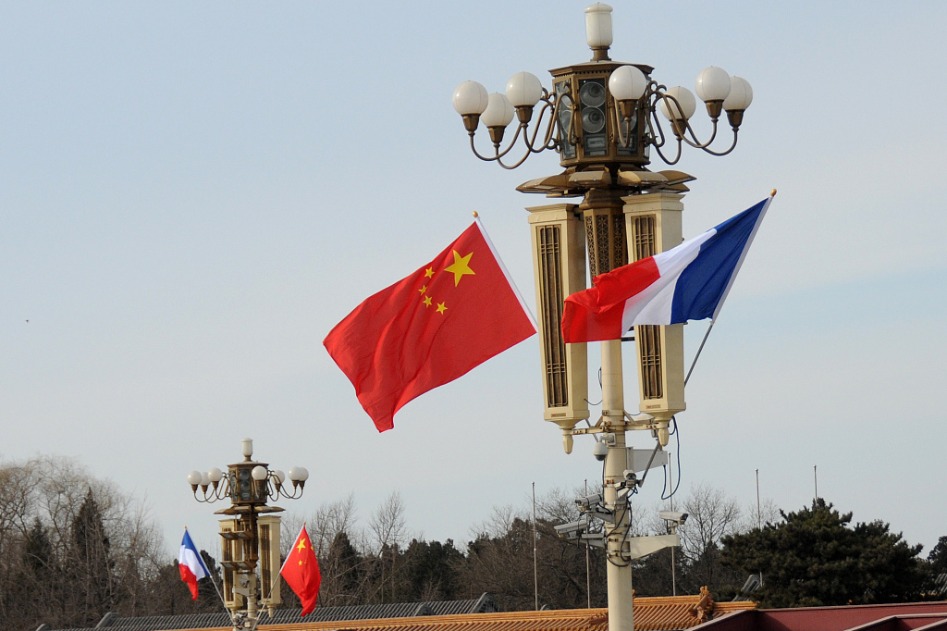Financial market key to spurring GDP growth

China's consumer price index, the prime indicator of inflation, rose 3.8 percent year-on-year in October, the National Bureau of Statistics said. Surging consumer prices accompanied by slowing economic growth have aroused concern over stagflation among some economists.
The Chinese economy expanded by 6 percent in the third quarter of 2019, and the full-year growth rate is expected to be around 6.2 percent, the lowest in nearly three decades.
The three major components of gross domestic product are consumption, investment (including government spending) and net exports. The United States used to be the biggest contributor to China's trade surplus. But because of Sino-US trade frictions, net exports' contribution to China's GDP growth was - 8.6 percent in 2018.
Financial market key to spurring GDP growth
Despite modest improvement in foreign trade in 2019, with a slight year-on-year increase in the trade volume in the first three quarters, the side effects of Sino-US trade frictions will continue to threaten growth. In the first half of 2019, domestic consumption grew by 8.4 percent, becoming the main driver of economic growth. In terms of investment, fixed-asset investment accounted for the highest percentage, especially investment on infrastructure by local governments.
Given the concerns over stagflation, policymakers will face a dilemma when framing monetary policy. Tighter monetary policy can help ease inflation, but will hamper growth, while looser monetary policy aimed at stimulating growth by lowering interest rates will further exacerbate inflation.
This year, the People's Bank of China, the country's central bank, has lowered the reserve requirement ratio twice, by 1 percentage point in January and 0.5 percentage points in September, injecting 2.5 trillion yuan ($355.5 billion) into the economy to boost liquidity. Despite that, the downward trend of the real economy could not be substantially reversed.
Loose fiscal policy, marked by continued tax and administrative fee reduction and extended public financial expenditure, could help gradually end stagflation. However, at the end of September, the government cut $255.8 billion in taxes and administrative fees, using up almost 90 percent of the $284 billion quota.
In the meantime, China's national deficit ratio and debt-to-GDP ratio are both approaching the warning line. In addition, the government has accumulated high debt over the past few years. If not paid off in the next two to three years, ideally, a debt crisis could ensue dealing a heavy blow to the broader economy.
To resist the downward pressure and prevent stagflation, China would do well to roll out more favorable policies for the financial markets in order to prop up GDP growth. After all, more wealth created in the financial market will lead to increased investment and domestic consumption. The effects of a revived stock market are no less than any fiscal stimulus.
Over the past two years, the central authorities have reiterated that equity financing should be vigorously developed to become a more important means of social financing than debt financing. Revitalizing the financial markets and promoting stock market development will kill two birds with one stone. On the one hand, it will restore national confidence, resolve small and medium-sized enterprises' financing difficulties, and prevent further slowdown of growth. On the other hand, it will reduce the credit risk associated with debt financing, deal with some financial fraud problems and channel the funds into a new "pool" to ease inflation.
Making stock market development a priority and encouraging equity investment will create more wealth for secondary market investors. Specifically, the proportion of direct financing should be greatly increased and more favorable securities transaction policies - such as canceling dividends tax and stamp tax - should be rolled out.
China still uses loose monetary policy to inject liquidity into the market. In September, China's State Administration of Foreign Exchange removed quotas on two major inbound investment schemes - the dollar-denominated qualified foreign institutional investor scheme, and the renminbidenominated qualified foreign institutional investor program - to attract more foreign capital. Which means China's financial market doesn't lack money. However, due to institutional problems, Chinese companies often race to get listed and ordinary stock market investors often get ripped off.
To revitalize China's stock market at the macro level, the central authorities should have the right understanding of the market and attach greater importance to its development through continued policy support. At the micro level, market rules and the supervision system should be further improved.
Modern finance is of two types: monetary finance, an indirect debt financing system with commercial banks and money market as the main body; and capital finance, a direct equity investment and financing system led by investment banks with capital market as the main body. True, monetary finance remains a big source of financing. But as capital markets become increasingly important, policymakers should rethink relevant market rules to protect investors and benefit the huge number of investors in the secondary market.
More proper allocation of wealth is the key to sound development of the stock market. Listed companies should be guided to realize win-win result in the market by creating incremental value, instead of only major stockholders realizing personal wealth growth by selling stocks, as unreasonable wealth allocation will lead to polarization in the market.
To solve this problem, listed companies should establish a more reasonable ownership structure. In initial public offering, the largest shareholder's shareholding ratio should be reduced to no more than 35 percent and the selling price in the secondary market should be better regulated. Private and family businesses should evolve to embrace a modern, more scientific, corporate governance structure. And a more rigorous information disclosure system is badly needed in the secondary market to increase punishment for crimes against the law.
In addition, financiers and stock issuers should be well versed in matters of finance and market, and the responsibilities of all issuing parties should be explicitly defined, including listed companies, securities firms, lawyers, appraisers and bourses. Besides, securities regulators should deepen the reform of the supervision system to make clear the relationship between China Securities Regulatory Commission, stock exchanges, securities firms and fund companies.
Liu Jipeng is dean of School of Business at China University of Political Science and Law. Liu Biao is a research fellow with the Capital Finance Institute at China University of Political Science and Law.
The author contributed this article to China Watch exclusively. The views expressed do not necessarily reflect those of China Watch.
All rights reserved. Copying or sharing of any content for other than personal use is prohibited without prior written permission.

































